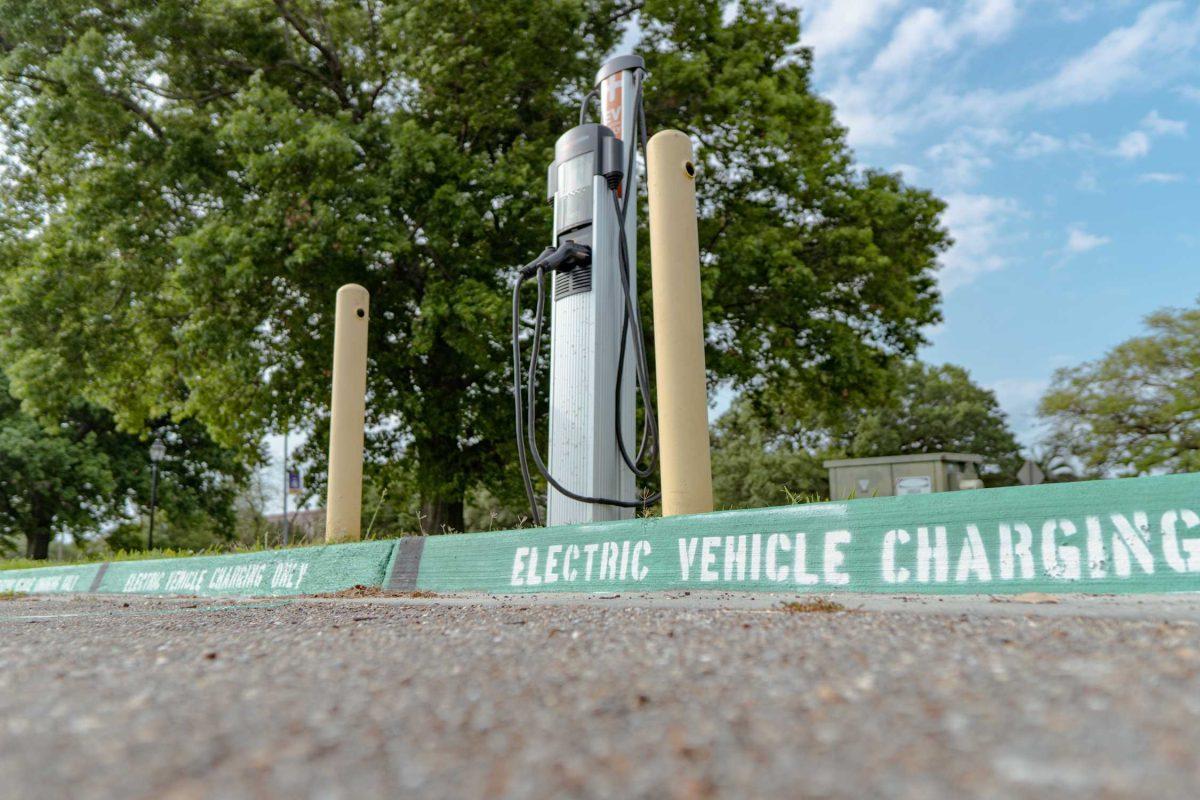Despite increased availability of electric vehicles at cheaper prices, the LSU community hasn’t embraced the alternative to traditional vehicles.
There are only 34 students, faculty, and staff members who are registered to park their electric vehicles at designated parking spots on LSU’s campus, according to Tammy Millican, executive director of Facility and Property Oversight.
“When we first installed two [electric vehicle charging stations] as part of an Entergy grant in 2011, there were no electric vehicles on campus,” Millican said. “But there has been a steady increase since then.”
In the decade since, the number has doubled to four double-port charging stations in various parking lots across campus, including stations at parking lots near Tiger Stadium, the Natatorium, Cypress Hall, and Patrick F. Taylor Hall.
In the years since initial installation in 2011, electric vehicle drivers have avoided nearly 36,000 kilograms in greenhouse gas emissions, according to Millican.
“Campus sustainability is excited to see the growing number of electric vehicles drivers on campus,” Millican said. “We expect the number of EV drivers to continue to rise, so we are already planning on additional charging stations as demand from the campus community grows.”
A part of the university’s electric charging expansion is a grant for the installation of three more double-port charging stations. The grant, from the Louisiana Department of Environmental Quality, comes as part of the 2017 settlement reached following the Volkswagen emissions scandal, in which the company was required to invest $2 billion into electric charging infrastructure, and $2.7 billion into a mitigation trust.
One of the major factors in expanding the pool of electric vehicle drivers is the significant decrease in price over the past decade.
“Five to 10 years ago, we were looking at the challenge that the vehicles were very costly and that was mostly because of the battery technology, which remains the most expensive component,” Mehdi Faraset, associate professor of electrical and computer engineering, said. “But due to recent advancements, now that barrier of price is broken and it is very comparable to the conventional vehicle.”
Faraset, whose research lies in the realm of electric vehicles and their power efficiency, cites the Tesla Model 3 as an affordable entry point to electric vehicles.
A 2022 Tesla Model 3 starts at $46,990. According to a 2022 Kelley Blue Book study, the average price for a new car was $47,000, making the Tesla Model 3 an average-priced car, where electric vehicles like the early models of the Tesla were once priced at over $100,000.
Another issue that Faraset cites is limited access to charging stations, an issue familiar to Baton Rouge.
Outside of LSU, charging still remains lacking in electric vehicle charging stations, especially compared to other similarly sized cities.
Baton Rouge, a city with a population near a quarter million, has only a fraction of electric vehicle charging stations of the similarly populated Richmond, Virginia, with a population of about 230,000. According to chargehub.com, Richmond has 128 charging stations, while Baton Rouge only has 48, including the four on LSU’s campus, despite Richmond’s population being slightly smaller.
But Louisiana, like LSU, is beginning to change its policies toward electric vehicles as demand increases.
As part of the Infrastructure Investment and Jobs Act, Louisiana is set to receive $75 million over the next five years for investment in electric vehicle infrastructure, including $14 million allocated for the first fiscal year.
“We aim to have Louisiana become a competitor in EVs, and in doing so want to convert the appropriate allocation of ‘gas’ station assets into ‘fuel’ stations where a wide variety of fuels are available, electricity for recharging EV batteries being one of them,” Louisiana Department of Transportation and Development Secretary Shawn Wilson said in a press release on Feb. 16.
A major step of upgrading charging infrastructure as outlined in the plan is maximizing efficiency, as well as, strides into wireless charging power.
“Nothing is commercialized yet, but for the future, we are looking at the convenience of wireless charging that is better than traditional, bulky wired chargers,” Faraset explained.
His research into energy management in electric fuel cells and power conversion seeks “to enhance efficiency and reduce the loses so we can extend driving ranges on a single charge cycle.”
“Once that issue is resolved and we have overcome that barrier, I think the path for a complete shift toward electric vehicles is going to be happening,” Faraset said.
LSU expanding electric vehicle charging, battery efficiency research
April 22, 2022
Writing denotes the electric vehicle charging parking spaces on Sunday, April 17, 2022, in the South Quad Drive parking lot in Baton Rouge, La.





